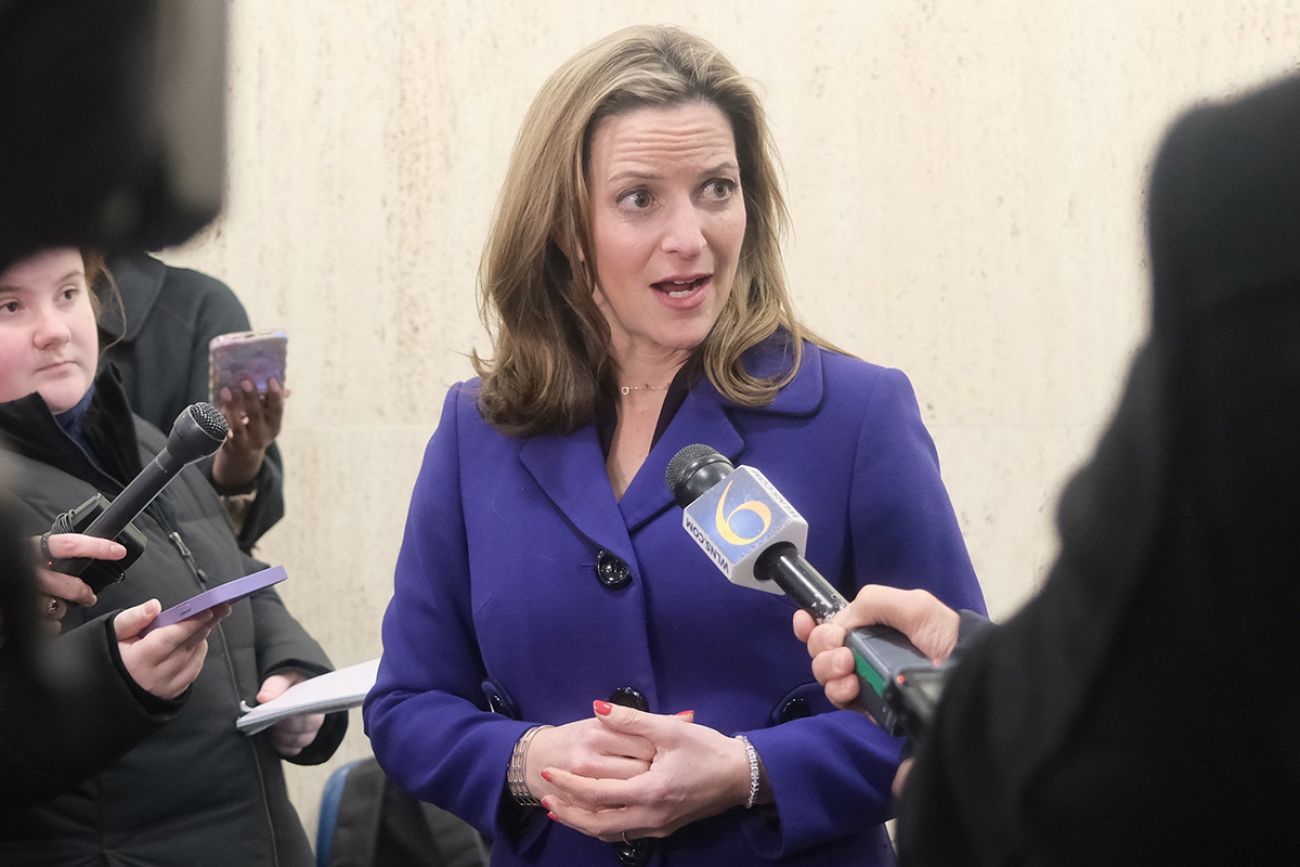Jocelyn Benson: Fixes coming to buggy $9M Michigan campaign finance system

- Secretary of State Jocelyn Benson said it will be months before issues are resolved with the new Michigan Transparency Network
- The new software is meant to allow the public to access key disclosures filed by politicians and lobbyists
- Republican House Speaker Matt Hall has suggested the chamber should investigate the portal
Michigan Secretary of State Jocelyn Benson says her department’s beleaguered new campaign finance and lobbying disclosure portal will eventually offer “more transparency than ever before” — but it may be months before the revamped system is able to provide the same details as the version it replaced.
In an interview with Bridge Michigan, the 2026 gubernatorial hopeful said she wants “to be known as the governor who puts transparency and efficiency at the forefront” in a state known for secrecy and weak disclosure laws.
However, her department has conceded the new “Michigan Transparency Network” (MiTN) is not yet delivering what its name promises — or what is envisioned for the ongoing five-year, $9 million overhaul.
“We're not where we expected to be at this point in the transition,” Michigan Department of State spokesperson Angela Benander said in a statement, adding the department’s “top leadership” is now working on the issues.
“Once we've gotten through this bumpy transition, MiTN will be easier for everyone to use and much more transparent than the old system,” she promised.
At issue is the state’s new online portal that allows the public to access documents on ethics issues including campaign finance records, lobbyist spending and lawmakers’ personal financial disclosures.
Related:
- Jocelyn Benson spent $9M on new transparency portal. Critics say it’s a mess
- Who funds Michigan lawmakers? Most get cash from PACs, not voters they represent
- Billionaires, dark money dominate record-setting Michigan election spending
Put to the test during recent campaign finance deadlines, users complained about the functionality of the system, and the public was able to access less information than before.
For instance, the public can no longer view a lobbyist’s registered clients, or how much money a candidate raised or spent in a given period. Descriptions of transactions and fundraisers are severely truncated, obscuring key information.
“Not having access to campaign finance tools for months impedes investigative journalism into the influence of money on politics and makes it easier to hide corruption,” said Neil Thanedar, executive director of the Michigan Campaign Finance Network, a money-in-politics watchdog.
Benson, a Democrat, called the regression in the amount of publicly available information about campaign finances and lobbying “a temporary feature as we upgrade the system.”
“It’s my understanding, and the briefings I've received, that won't last for more than a few months,” she said. “We have been given consistent assurances that a lot of the challenges that we've been encountering will be addressed.”
‘Challenging to build things with’
Broken functions and limited features that Bridge documented last month still persist with the new system, hamstringing the ability of ethics watchdogs, activists and the public to access disclosure data. Campaign finance records are also explicitly exempt from Michigan’s public requests law, potentially complicating the public’s ability to get the data through other means.
In a press conference last week, Republican House Speaker Matt Hall of Richland Township suggested the lower chamber’s oversight committee “should pull in Jocelyn Benson and try to figure out what the hell happened to the $9 million” spent on the new system.
He called the new portal “less transparent” and “not user-friendly.”
Tyler Technologies, one of the largest government software contractors in the country, is revamping Michigan’s system under a state contract.
The Texas-based firm was the only company to bid on the project but has been “challenging to build things with,” according to Benson.
“All that said, I'm really proud of the folks in our department who have worked with limited resources to build out this system, and I think they're going to continue to see it improve over time,” she added.
A spokesperson for Tyler Technologies previously redirected questions from Bridge about the portal to the Michigan Department of State.
While Benson’s department signed the contract with Tyler Technologies, procurement is overseen by the Michigan Department of Technology Management, which Benson said “we have to collaborate with but we don't have total control over.”
Bloomberg Businessweek reported Tyler Technologies has a “near-monopoly” on the lucrative business of developing software for governments. But governments from North Carolina to Illinois have reported dissatisfaction. The company’s overhaul of the North Carolina state court software allegedly led to wrongful arrest and is now at the center of a class-action civil rights lawsuit.
‘Growing pains’ or something more?
As she seeks the Democratic nomination for governor next year, Benson defended her transparency initiatives in government. As Secretary of State she testified before the Legislature advocating for making the weak disclosure laws for public officials more robust.
“You have to also see it in the broader context of how our office has done more than any other agency in state government to meet the moment and be transparent,” she said.
Benson noted her department posts some Freedom of Information Act requests online and is launching a website for "election transparency, where everyone can see all the training materials and everything else that we provide.”
At the same time, her office is facing a subpoena from the GOP-controlled Michigan House for allegedly not being sufficiently forthcoming about their requests for election training documents.
Brett McRae, who owns the compliance company Campaign Finance Services, said the new filing system was slower than the last one when he used it during the most recent campaign finance filing deadline at the end of April.
The new system struggled with importing transactions and required him to do much of the work by hand, he said.
“There are a lot of issues that are going to have to be resolved,” McRae said, noting he was “not surprised that the initial filing was kind of bumpy, because that's how it tends to go with government computer projects.”
If things can be fixed by July, McRae said, the rough start might just be considered “growing pains.”
“But if they haven't figured things out, especially the import function, then I'm going to be pretty upset,” he added.
See what new members are saying about why they donated to Bridge Michigan:
- “In order for this information to be accurate and unbiased it must be underwritten by its readers, not by special interests.” - Larry S.
- “Not many other media sources report on the topics Bridge does.” - Susan B.
- “Your journalism is outstanding and rare these days.” - Mark S.
If you want to ensure the future of nonpartisan, nonprofit Michigan journalism, please become a member today. You, too, will be asked why you donated and maybe we'll feature your quote next time!




